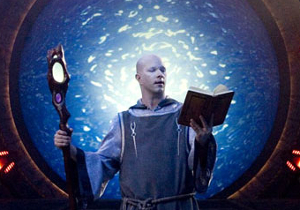Some of My Best Friends Are Science
Honest!
Wednesday, February 5, 2020 8:40 pm
You might suppose, after reading a fair number of my posts, that I have a hostility for science and scientists.
I don't.
However, science these days usually manifests as scientism, the idea that knowledge begins and ends in the laboratory. Moreover, scientists think that their atheism is proved by their science, when, of course, atheism is a philosophical choice. By and large I am just annoyed by the metaphysical sloppiness of modern scientists, not to mention their arrogant dismissal of God and of religion.
I am especially annoyed by convoluted absurdities — such as the multiverse — that scientists cling to because they cannot entertain theism.
Anyhow, science is good. Science is great! No, I'm not some twittering dolt who Fuckin s Science. I genuinely love science. Mankind should study every bit of Creation — and learn its every fact. The thing is, those are not the only facts; and it is Creation itself that alerts us to the facts outside it.
I don't.
However, science these days usually manifests as scientism, the idea that knowledge begins and ends in the laboratory. Moreover, scientists think that their atheism is proved by their science, when, of course, atheism is a philosophical choice. By and large I am just annoyed by the metaphysical sloppiness of modern scientists, not to mention their arrogant dismissal of God and of religion.
I am especially annoyed by convoluted absurdities — such as the multiverse — that scientists cling to because they cannot entertain theism.
Anyhow, science is good. Science is great! No, I'm not some twittering dolt who Fuckin s Science. I genuinely love science. Mankind should study every bit of Creation — and learn its every fact. The thing is, those are not the only facts; and it is Creation itself that alerts us to the facts outside it.
The Multiverse Is an Evasion
Fine Tuning Without a Tuner
Tuesday, February 4, 2020 10:22 pm
You’ve all heard the silly formulation. Given infinite monkeys on infinite typewriters in infinite time, one of those monkeys will tap out the complete works of Shakespeare. You see, improbable as that may be, the probability is not zero. Thus it must happen!
But is a probability that low — even assuming it is accurate — really other than zero? The universe is quantized. It is not a continuum. There are not infinite values of anything small. There is always a gap above zero, a very real sense in which some numbers are not allowed. Not everything can happen. Ridiculously tiny probabilities are meaningless. They vanish into that gap.
But is a probability that low — even assuming it is accurate — really other than zero? The universe is quantized. It is not a continuum. There are not infinite values of anything small. There is always a gap above zero, a very real sense in which some numbers are not allowed. Not everything can happen. Ridiculously tiny probabilities are meaningless. They vanish into that gap.
Desperately Seeking E.T.
A Peculiar Sort of Hype
Wednesday, May 29, 2019 11:44 am
In a lecture in October of 2015, Dr. Carolyn Porco, Imaging Team Leader for the Cassini Mission to Saturn, said, regarding the chance of life on Enceladus:
Should we ever make such a discovery, if we ever, anywhere, find that there has been a second, independent genesis in our Solar System, then I think that at that point the spell is broken. The existence theorem has been proven. And we could safely infer from that, that life is commonplace; that it is not a bug but a feature of the universe in which we live and that it has occurred a staggering number of times throughout the 13.7 billion years of the history of the cosmos. And I think that that might be the kind of discovery that could change a great many things.Maybe I'm just curmudgeonly contrarian, but the discovery of extraterrestrial life would not impress me.
Whence Then Hath It Cockle?
An Insight Into Theodicy
Thursday, March 7, 2019 10:00 pm
I'm not put out by the existence of evil. That is, I do not think it is some sort of terrible mystery, nor a thing to make one doubt the existence of God. You have heard it said: "A truly good God would never allow this! So there is no good God; indeed, no God at all." But that is not an argument. It is a kind of tantrum, really.
Religion as Fraud Is Boring
Why Not Try Harder With Your Conflict?
Tuesday, November 20, 2018 3:48 pm
There's a couple of things I dislike about the Ori arc in Stargate SG-1.
 First, it is facile and cowardly to cast Origin, the religion of the evil Ori, as a sort of medieval Christianity. Of course the Ori instigate a crusade against our galaxy. Why not a jihad? Because modeling Origin on Islam and having Stargate Command oppose a jihad would, I suppose, be mean to brown people. Or something. Mustn't be phobic! Except, of course, against Christians. Natch.
First, it is facile and cowardly to cast Origin, the religion of the evil Ori, as a sort of medieval Christianity. Of course the Ori instigate a crusade against our galaxy. Why not a jihad? Because modeling Origin on Islam and having Stargate Command oppose a jihad would, I suppose, be mean to brown people. Or something. Mustn't be phobic! Except, of course, against Christians. Natch.

Superfluous in Heaven
Even Sacred Music Is Mundane
Saturday, February 4, 2017 12:36 am
In the mid '80s, when I was a college boy, I regularly went to the record stores near campus. This was just before CDs and long before MP3s. You wanted music, you flipped through an alphabetized bin and found an LP. Anyhow, one day, while I was browsing for something new, a classical work of some sort started playing on the store stereo. It was beautiful and unfamiliar. I listened for quite a while. I finally asked the clerk what it was. He showed me the sleeve and I went to the proper bin. The LP was in stock. I bought it.
You Do Not Come Disassembled
A Thought About the Self
Friday, January 27, 2017 3:19 pm
The person who bristles at being labeled is being childish. You are not a special snowflake; you are always a member of some category. The only matter with a label is its accuracy.
Call me a Thomist and you would be right. More to the point, presume that my metaphysical ruminations hardly originate with me. I'm not trying to break ground, here; I'm sharing an understanding that I have acquired.
Call me a Thomist and you would be right. More to the point, presume that my metaphysical ruminations hardly originate with me. I'm not trying to break ground, here; I'm sharing an understanding that I have acquired.
© 2004-26 David Skinner · All rights reserved
